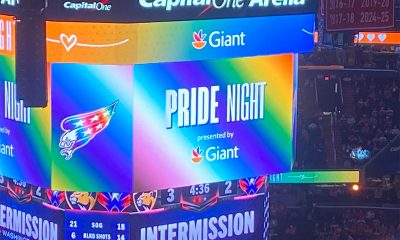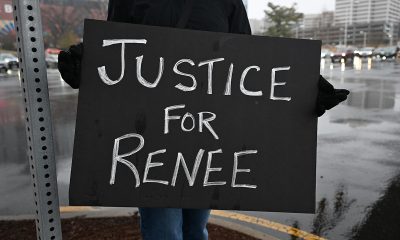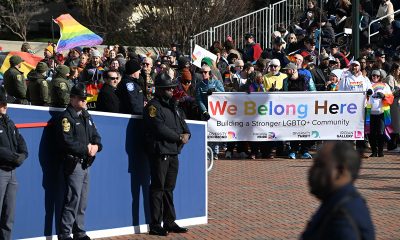Local
Capital Pride reiterates 2018 policy banning D.C. police from parade
Black Pride has no plans to ban officers
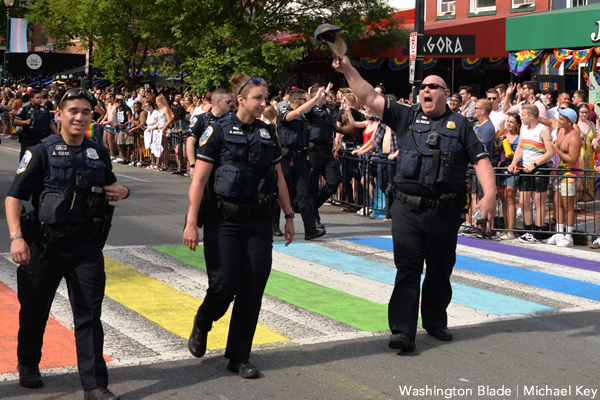
The Capital Pride Alliance, the group that organizes D.C.’s annual LGBTQ Pride events, says it adopted a policy in 2018 to ban uniformed D.C. police officers from marching in the Capital Pride Parade.
Some LGBTQ community members contacted by the Washington Blade, including D.C. Black Pride organizer Earl Fowlkes, have said they were unaware of the Capital Pride policy of not allowing police participation in the parade and other Capital Pride sponsored events.
Fowlkes, who serves as executive director of the D.C.-based Center for Black Equity, which supports Black Pride events throughout the country, said D.C. Black Pride has had police presence at some of its events over the past 30 years and has no plans to ban police from its activities.
Ryan Bos, the Capital Pride Alliance executive director, sent the Blade a statement he said Capital Pride posted on its website in June of 2020 formally announcing the police policy. The statement came five days after an earlier statement posted on the group’s website expressing strong solidarity with the Black Lives Matter movement.
“In 2018 the decision was made that MPD [D.C. Metropolitan Police Department] would not participate as a contingent in the Pride Parade, and has not since,” says the statement, which was posted on June 8, 2020. “Going forward, CPA will not permit any uniformed and armed police officers to march in the Pride Parade or participate in CPA-sanctioned events,” the statement continues.
“As required by the city government, MPD has jurisdiction to close and clear the streets,” the statement says. “The MPD will continue to manage street closures as outlined in permit requirements. When needed, CPA will hire private security as has been done previously.”
The statement concludes by saying Capital Pride Alliance was committed to having “further talks with its LGBTQ+ partners and other organizations and the city to address the on-going concerns that have been raised by the community.” It adds that Capital Pride Alliance “will take additional actions in the coming days and weeks.”
Although the statement did not say so directly, it was referring to the earlier statement discussing Capital Pride’s support for the nationwide protests in June 2020 over the murder of Minneapolis resident George Floyd at the hands of a police officer who was later convicted of second-degree murder and manslaughter for Floyd’s death.
“Pride this year comes on the heels of a global pandemic and a nation confronting the murder of George Floyd at the hands of Minneapolis police officers,” the earlier statement posted on June 3, 2020, says.
“This horrific tragedy, and the murders of Breonna Taylor, Tony McDade, and Ahmaud Abrery by police and white vigilantes, have created a nationwide uprising crying out for racial justice and the protection of Black life,” the statement says.
“As members of the Black and Brown communities have stood with the LGBTQ+ community, the Capital Pride Alliance stands in complete solidarity to unite against those disparities that impact communities of color,” says the statement. “We pledge that we will work together to find solutions and make the positive changes that are so desperately needed to end inequity, injustice, and violence against people of color.”
In prior years, uniformed members of the D.C. police LGBT Liaison Unit have marched as a contingent in the Capital Pride Parade. During some prior years going back to the 1990s, D.C. police chiefs have joined the parade in police vehicles or watched the parade while standing along the parade route.
D.C. police spokesperson Dustin Sternbeck did not respond to a request by the Blade for comment on the Capital Pride policy of banning uniformed police participation in Pride events.
Gay retired D.C. Police Lt. Brett Parson, who served as director of the department’s Special Liaison Branch, which oversees the LGBT Liaison Unit, declined to comment on the Capital Pride ban on D.C. police participation.
Some LGBTQ activists have expressed the view that D.C. police participation in Pride events, especially participation by high-level police officials, was a sign of the D.C. police department’s strong support for the LGBTQ community.
But other activists, including members of the local transgender community, have said police crackdowns on sex workers, including transgender female sex workers of color, have involved what they believe to be a misplacement of police priorities. The local transgender and sex worker advocacy group No Justice No Pride has long called on Capital Pride to ban police from participation in all Pride-related events.
In the years since Capital Pride adopted its police policy, other cities, including Seattle, Denver, and just last week New York City’s Pride organization adopted policies banning police participation in their Pride parades and other Pride events.
Bos of Capital Pride said that similar to last year, due to COVID restrictions in place earlier this year, the traditional D.C. Pride Parade and festival will not be held in June this year. Although D.C. Mayor Muriel Bowser earlier this month removed all restrictions on large outdoor events beginning June 11, Bos said Capital Pride did not have time to organize a parade and festival for June. He said a Capital Pride Parade and festival are under consideration for October of this year.
The Capital Pride website includes information about a number of smaller Pride events for June, both in-person and virtual events. Among them will be a caravan of cars and vehicles decorated with Pride displays scheduled to travel across the city on June 12 to view houses and businesses that will display Pride decorations on their buildings or in their front yards.
Fowlkes said D.C. Black Pride organizers also fully support the Black Lives Matter movement and have condemned the incidents of police abuse, including the George Floyd murder in Minneapolis. But he said Black Pride organizers see no reason for banning police participation, especially the LGBT police officers who regularly attend Black Pride events.
“We’ve never had a problem,” he said. “Our members have never voiced a problem in dealing with the police,” according to Fowlkes.
“We know a lot of queer police officers and I welcome their presence,” Fowlkes said. “As long as they behave, I welcome everyone’s presence. It’s open to everybody. I can’t see eliminating the police any more than if people come in an Army uniform.”
David Johns, executive director of the D.C.-based LGBTQ group National Black Justice Coalition, has taken a different position than that of Black Pride.
“The D.C. Capital Pride Alliance was right to ban uniformed police from participating in the Pride Parade when it made its decision back in 2018,” Johns told the Blade in a statement. “For too many members of the LGBTQ+ community, especially Black LGBTQ+ and same-gender loving people, the presences of armed, uniform police make us feel less safe,” he said.
“It is important that the D.C. Capital Pride Alliance recognized that the struggle for civil rights for all must uplift all parts of us all of the time – including Black LGBTQ+ people who have too often been sidelined or excluded from the important discussions facing our community,” Johns said.
In yet another indication that the LGBTQ community is divided on the police issue, Washington Post columnist Jonathan Capehart, who’s gay and African American, wrote a column published in the Post on Monday expressing strong disagreement with the New York City Pride organization’s decision last week to ban LGBTQ police officers from marching in the New York Pride parade next month.
Capehart wrote that he fully understands the concerns over police abuse in New York and other cities in the past and in recent times. But he said he believes the New York Pride organizers made a “really bad call” in banning the NYPD Gay Officers Action League or GOAL from marching in this year’s parade.
“If you’ve been to a pride parade, you know it’s a celebration of acceptance and inclusion,” said Capehart in his column. “That’s why it’s beyond troubling that a community made up of so many who’ve been rejected by their families because of who they are is now turning on its own members because of what they do for a living,” he states. “This is wrong. This is shortsighted. This is a mistake.”
District of Columbia
Faith programming remains key part of Creating Change Conference
‘Faith work is not an easy pill to swallow in LGBTQ spaces’
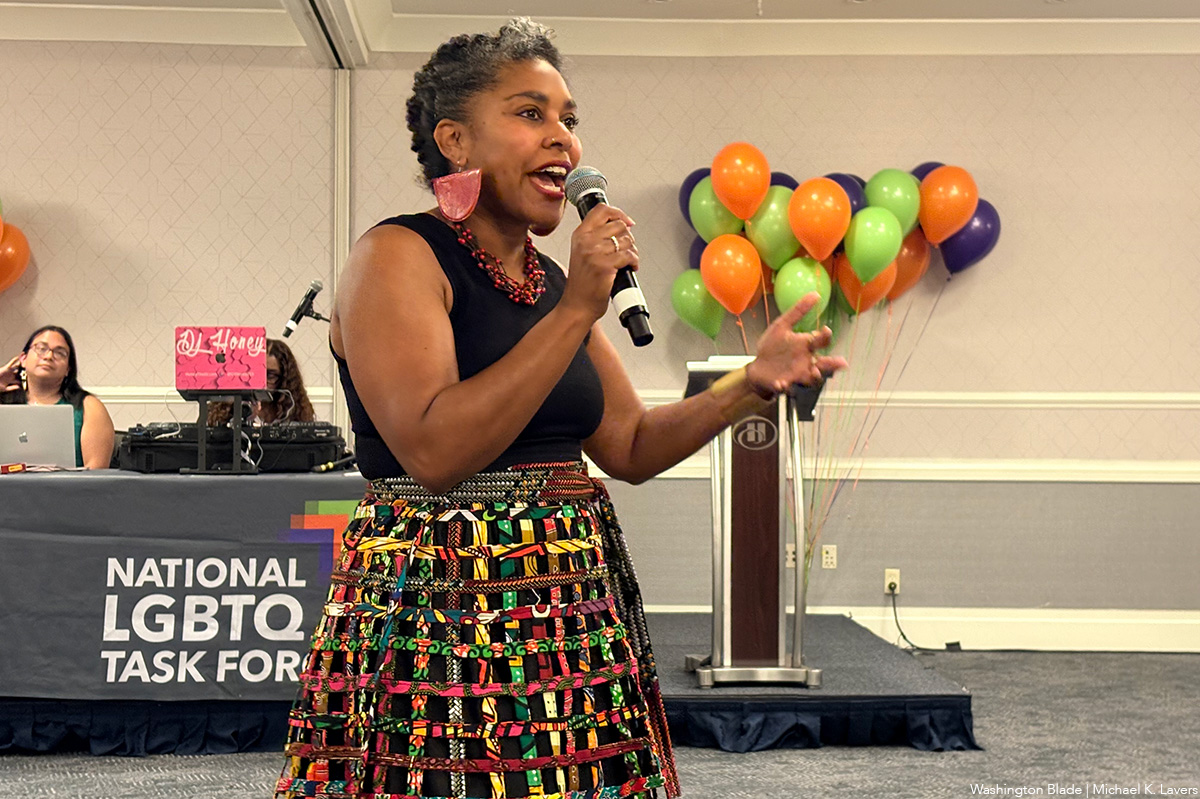
The National LGBTQ Task Force kicked off the 38th annual Creating Change conference in D.C. this week. This year, as with years past, faith and interfaith programming remains a key part of the conference’s mission and practice.
For some, the presence of faith work at an LGBTQ+ conference may seem antithetical, and Creating Change does not deny the history of harm caused by religious institutions. “We have to be clear that faith work is not an easy pill to swallow in LGBTQ spaces, and they’re no qualms about saying that we acknowledge the pain, trauma, and violence that’s been purported in the name of religion,” Tahil Sharma, Faith Work Director for the National LGBTQ Task Force, said.
In fact, several panels at the conference openly discuss acknowledging, healing from, and resisting religious harm as well as religious nationalism, including one scheduled today titled “Defending Democracy Through Religious Activism: A panel of experts on effective strategies for faith and multi-faith organizing” that features local queer faith activists like Ebony C. Peace, Rob Keithan, and Eric Eldritch who are also involved in the annual DC Pride Interfaith Service.
Another session will hold space for survivors of religious violence, creating “a drop-in space for loving on each other in healing ways, held by Rev. Alba Onofrio and Teo Drake.”
But Sharma and others who organized the Creating Change Conference explained that “a state of antipathy” towards religious communities, especially those that align with queer liberation and solidarity, is counterproductive and denies the rich history of queer religious activism. “It’s time for us to make a call for an approach to LGBTQ+ liberation that uses interfaith literacy as a tool rather than as a weapon against us,” Sharma explained.
Recognizing a local queer faith icon
Along with the panels, fighting religious nationalism and fostering communion with aligned faith activists and communities is at heart of this year’s faith work. As Sharma shared, “the person that we’re honoring this year for the faith award is Rev. Dr. Sofía Betancourt, and Dr. Betancourt is an amazing leader and someone who really stands out in representing UUs but also representing herself unapologetically.”
Based in the Washington, D.C. area, Dr. Betancourt has more than 20 years of experience working as a public minister, seminary professor, scholar, and environment ethicist, and public theologian. Her activism is rooted in her lived identities as a queer, multiracial, AfroLatine first-generation daughter of immigrants from Chile and Panama, and has been a critical voice in advancing the United Universalism towards anti-racist and pluralistic faith work.
Creating a faith-based gathering space
Sharma also said that faith fosters a unique space and practice to encounter grief and joy. For this reason, Sharma wants to “create a space for folks to engage in curiosity, to engage in spiritual fulfillment and grounding but also I think with the times that we’re in to lean into some space to mourn, some space to find hope.” The Many Paths Gathering Space serves this purpose, where visitors can stop for spiritual practice, speak with a Spiritual Care Team member, or just take a sensory break from the bustle of the conference.
This also means uplifting and foregrounding queer religious ephemera with an ofrenda to honor those who have passed, a display of nonbinary Korean American photographer Salgu Wissmath’s exhibition Divine Identity, and the Shower of Stoles, a collection of about 1,500 liturgical stoles and other sacred regalia representing the lives of lesbian, gay, bisexual, and transgender people of faith.
The Shower of Stoles
The collection was first started in 1995 by Martha Juillerat and Tammy Lindahl who received eighty stoles that accompanied them and lent them solace as they set aside their ordinations from the Presbyterian Church. The whole collection was first displayed at the 1996 General Assembly of the Presbyterian Church in New Mexico. The stoles, according to the Task Force, “quickly became a powerful symbol of the huge loss to the church of gifted leadership.”
Each stole represents the story of a queer person who is active in the life and leadership of their faith community, often sent in by the people themselves but sometimes by a loved one in their honor. About one third of all the stoles are donated anonymously, and over three-quarters of the stoles donated by clergy and full-time church professionals are contributed anonymously.
The collection shows “not just the deep harm that has been caused that does not allow people to meet their vocation when they’re faith leaders, but it also speaks to how there have been queer and trans people in our [faith] communities since the beginning of our traditions, and they continue to serve in forms of leadership,” Sharma explained.
Explicit interfaith work
Along with creating a sacred space for attendees, hosting workshops focused on faith-based action, and recognizing DC’s rich queer religious history, Creating Change is also hosting explicitly faith services, like a Buddhist Meditation, Catholic Mass, Shabbat service, Jummah Prayer Service, and an ecumenical Christian service on Sunday. Creating Change is also welcoming events at the heart of queer religious affirmation, including a Name/Gender/Pronoun/Identity Blessing Ritual and a reading and discussion around queer bibles stories with Rev. Sex (aka Rev. Alba Onofrio).
But along with specific faith-based programs, Sharma explained, “we’re looking to build on something that I helped to introduce, which was the separation of the interfaith ceremony that’s happening this year which is a vigil versus the ecumenical Christian service which is now the only thing that takes place on Sunday morning.”
This includes an Interfaith Empowerment Service this evening and an Interfaith Institute tomorrow, along with “Sing In the Revolution,” an event where folks are invited “to actually engage in the joy and rhythm of resolution and what that looks like,” Sharma said. One of the key activators behind this work is Rev. Eric Eldritch, an ordained Pagan clergy person with Circle Sanctuary and a member of the Pride Interfaith Service planning committee.
Affirming that queer faith work is part of liberation
The goal for this year, Sharma noted, alongside holding space and discussions about faith-based practice and liberation and intentional interfaith work–is to move from thinking about why faith matters in queer liberation spaces to “how is interfaith work the tool for how we’re engaging in our understanding of de-escalation work, digital strategies, navigating a deeper visioning that we need for a better world that requires us to think that we’re not alone in the struggle for mutual abundance and liberation,” Sharma explained.
It may surprise people to learn that faith work has intentionally been part of the National LGBTQ+ Task Force since its beginning in the 1980s. “We can really credit that to some of the former leadership like Urvashi Vaid who actually had a sense of understanding of what role faith plays in the work of liberation and justice,” Sharma said.
“For being someone who wasn’t necessarily religious, she certainly did have a clear understanding of the relationship between those folks who are allies, those folks who stand against us, and then those folks who sit in between–those folks who profess to be of religious and spiritual background and also are unapologetically LGBTQ+,” he continued.
This year’s faith programming builds on this rich history, thinking about “a way to kind of open doors, to not just invite people in but our people to go out into the general scene of the conference” to share how faith-based work is a tool, rather than a hindrance, to queer liberation work.
Virginia
McPike prevails in ‘firehouse’ Dem primary for Va. House of Delegates
Gay Alexandria Council member expected to win 5th District seat

Gay Alexandria City Council member Kirk McPike emerged as the clearcut winner in a hastily called Jan. 20 “firehouse” Democratic primary for a seat in the Virginia House of Delegates representing Alexandria.
McPike, who was one of two gay candidates running in the four-candidate primary, received 1,279 votes or 60.5 percent, far ahead of gay public school teacher Gregory Darrall, a political newcomer who received 60 votes or 3 percent.
Former Alexandria City School Board member Eileen Cassidy Rivera came in second place with 508 votes or 24 percent and Northern Virginia criminal law defense attorney Chris Leibig finished in third place with 265 votes or 12.5 percent.
Each of the candidates expressed strong support for LGBTQ-related issues.
With less than a week’s notice, Democratic Party officials in Alexandria called the primary to select a Democratic nominee to run in the Feb. 10 special election to fill the 5th District House of Delegates seat being vacated by state Del. Elizabeth Bennett-Parker (D-Alexandria).
Bennett-Parker won the Democratic nomination for the Virginia State Senate seat being vacated by gay state Sen. Adam Ebbin (D-Alexandria), who is resigning from his seat to take a position in the administration of Democratic Virginia Gov. Abigail Spanberger, who took office on Jan. 17.
Bennett-Parker won the nomination for Ebbin’s state Senate seat in yet another firehouse primary on Jan. 13 in which she defeated three other candidates, including gay former state Del. Mark Levine.
McPike, a longtime LGBTQ rights advocate, first won election to the Alexandria City Council in 2021. He has served for 13 years as chief of staff for gay U.S. Rep. Mark Takano (D-Calif.) and has remained in that position during his tenure on the Alexandria Council. He told the Washington Blade he will continue as chief of staff until next month, when he will resign from that position before taking office in the House of Delegates.
He received the endorsement of Ebbin, U.S. Rep. Don Beyer (D-Va.), and the LGBTQ Victory Fund in his race for the 5th District Va. House seat. Being an overwhelmingly Democratic district, virtually all political observers expect McPike to win the Feb. 10 special election.
He will be running against Republican nominee Mason Butler, a local business executive who emerged as the only GOP candidate running for the delegate seat.
“Thank you to the voters of Alexandria for choosing me as the Democratic nominee in the House of Delegates District 5,” McPike said in a statement released shortly after the vote count was completed. “It is an incredible honor to have the opportunity to fight for our community and its values in Richmond,” he said.
“I look forward to continuing to work to address our housing crisis, the challenge of climate change, and the damaging impacts of the Trump administration on the immigrant families, LGBTQ+ Virginians, and federal employees who call Alexandria home,” he stated.
He praised Ebbin for his longstanding support for the LGBTQ community in the Virginia Legislature and added, “If elected to the House of Delegates in the Feb. 10 general election, I will continue to fight to protect the rights and freedoms of LGBTQ+ Virginians from my new position in Richmond.”
Gay candidate Darrall’s campaign website said he is a “proud progressive, lifelong educator, and labor leader running to put people first.” It says he is a political newcomer “with more than 20 years in the classroom” as a teacher who played a key role in the successful unionization of Fairfax Public Schools.
“He is a proud member and staunch supporter of the LGBTQIA+ community,” his website statement said.
District of Columbia
Sold-out crowd turns out for 10th annual Caps Pride night
Gay Men’s Chorus soloist sings National Anthem, draws cheers
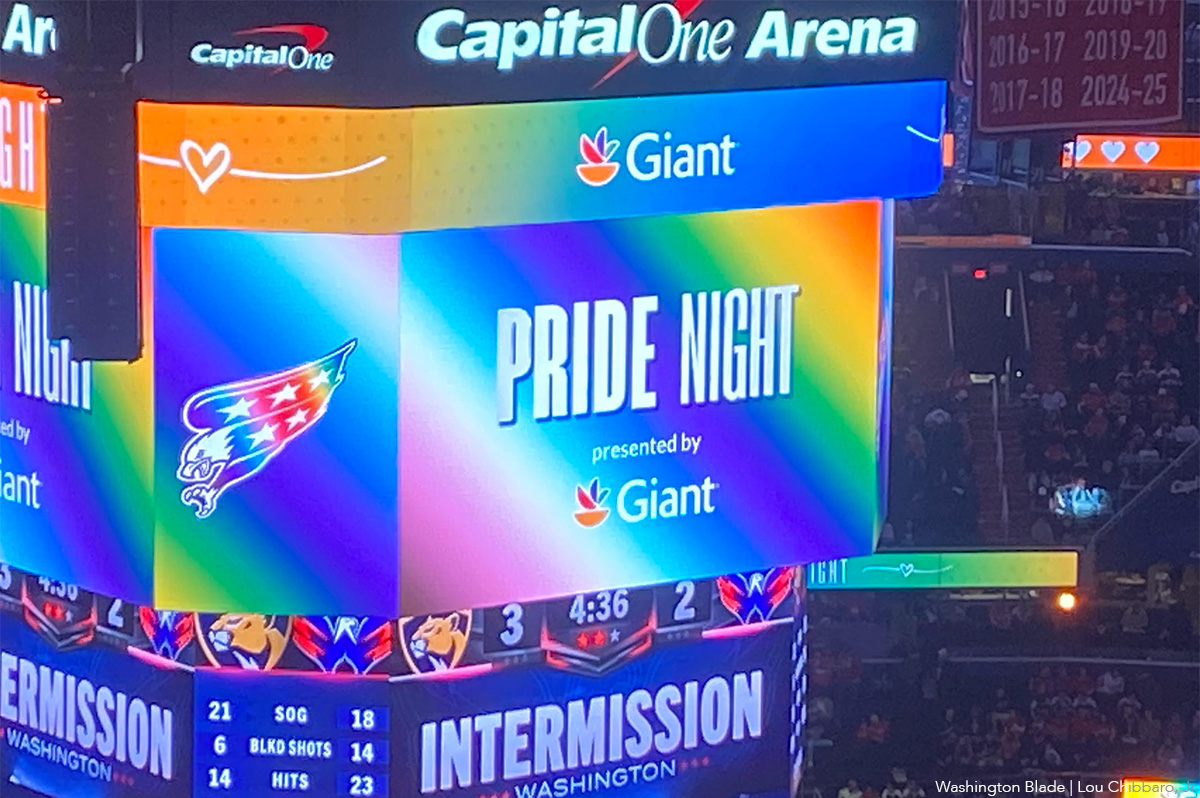
A sold-out crowd of 18,347 turned out on Jan. 17 for the 10th annual Pride Night at the Washington Capitals hockey game held at D.C.’s Capital One Arena.
Although LGBTQ Capitals fans were disappointed that the Capitals lost the game to the visiting Florida Panthers, they were treated to a night of celebration with Pride-related videos showing supportive Capitals players and fans projected on the arena’s giant video screen throughout the game.
The game began when Dana Nearing, a member of the Gay Men’s Chorus of Washington, sang the National Anthem, drawing applause from all attendees.
The event also served as a fundraiser for the LGBTQ groups Wanda Alston Foundation, which provides housing services to homeless LGBTQ youth, and You Can Play, a nonprofit organization dedicated to advancing LGBTQ inclusion in sports.
“Amid the queer community’s growing love affair with hockey, I’m incredibly honored and proud to see our hometown Capitals continue to celebrate queer joy in such a visible and meaningful way,” said Alston Foundation Executive Director Cesar Toledo.
Capitals spokesperson Nick Grossman said a fundraising raffle held during the game raised $14,760 for You Can Play. He said a fundraising auction for the Alston Foundation organized by the Capitals and its related Monumental Sports and Entertainment Foundation would continue until Thursday, Jan. 22
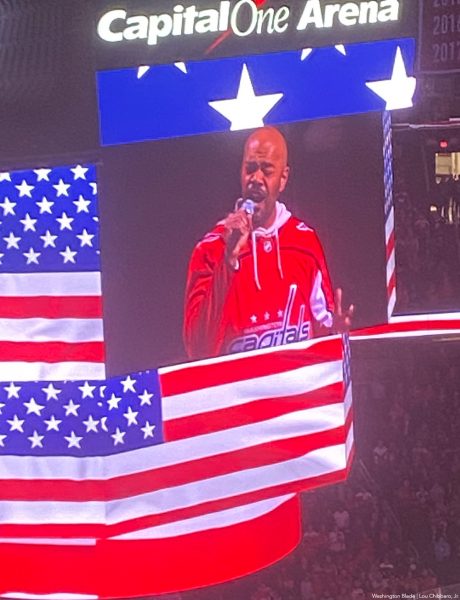
A statement on the Capitals website says among the items being sold in the auction were autographed Capitals player hockey sticks with rainbow-colored Pride tape wrapped around them, which Capitals players used in their pre-game practice on the ice.
Although several hundred people turned out for a pre-game Pride “block party” at the District E restaurant and bar located next to the Capital One Arena, it couldn’t immediately be determined how many Pride night special tickets for the game were sold.
“While we don’t disclose specific figures related to special ticket offers, we were proud to host our 10th Pride night and celebrate the LGBTQ+ community,” Capitals spokesperson Grossman told the Washington Blade.
-

 Virginia5 days ago
Virginia5 days agoVa. Senate approves referendum to repeal marriage amendment
-

 Theater5 days ago
Theater5 days agoVoiceless ‘Antony & Cleopatra’ a spectacle of operatic proportions
-

 Real Estate4 days ago
Real Estate4 days agoTop buyer-friendly markets for the LGBTQ community
-

 Virginia5 days ago
Virginia5 days agoVIDEO: LGBTQ groups march in Va. inaugural parade

